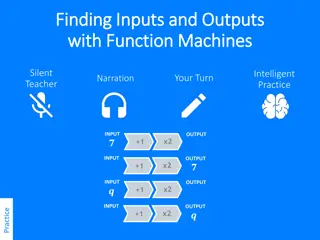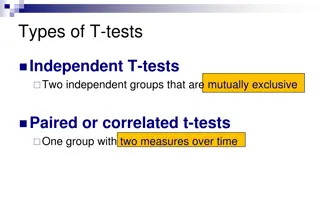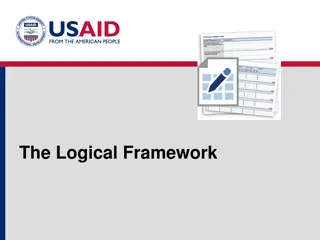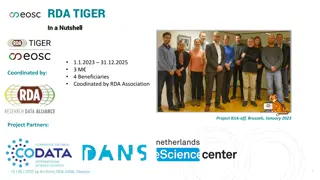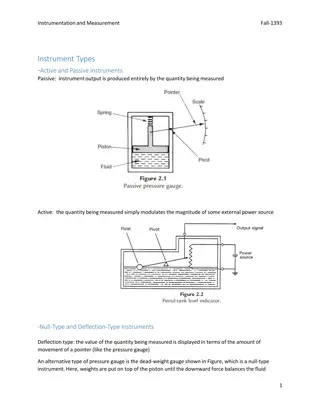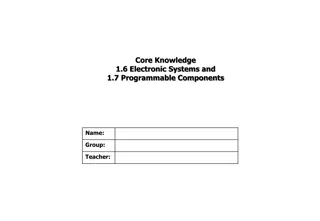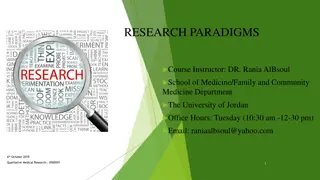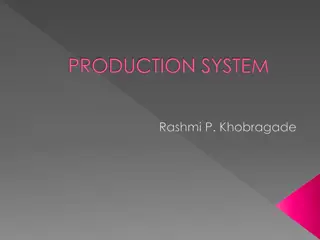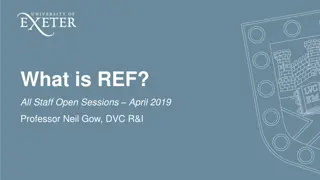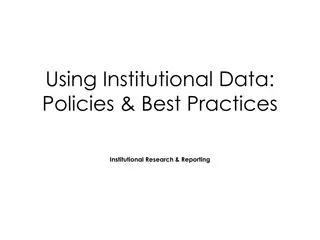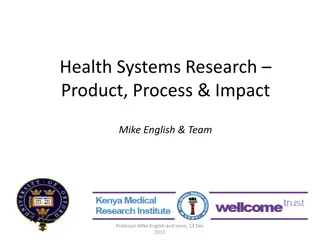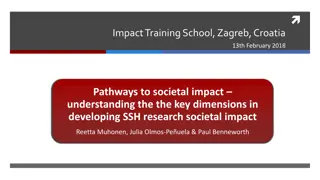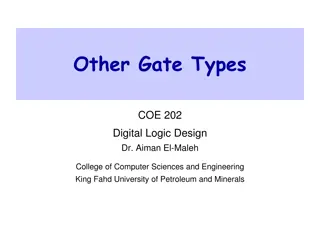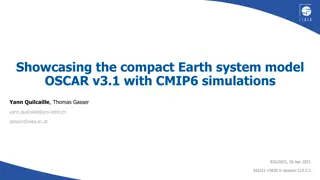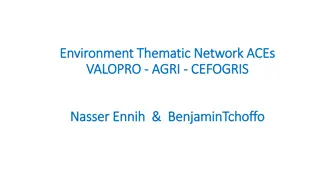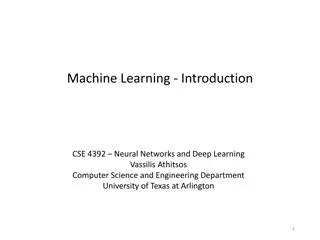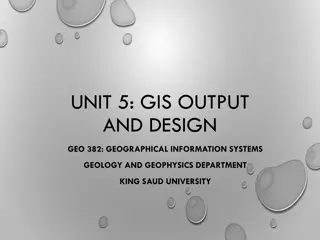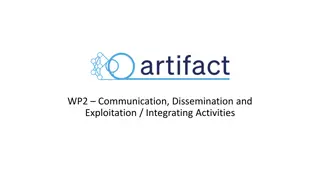Regional Climate Modeling in CORDEX South Asia for Climate Change Research
This information details the regional climate modeling efforts within the CORDEX South Asia framework, focusing on high-resolution dynamical downscaling of CMIP5 climate projections. It highlights the activities, opportunities, and challenges for assessing regional climate change, along with future
4 views • 11 slides
Understanding Sequential Logic Circuits in Digital Systems
Logic circuits in digital systems can be either combinational or sequential. Sequential circuits utilize storage elements along with logic gates, where outputs depend not only on present inputs but also on past inputs and internal states. They are essential building blocks, with storage registers pl
5 views • 20 slides
UCC Research Support and Strategies Overview
UCC's Research Support, Policy & Strategy function, led by David O'Connell, PhD, provides comprehensive support for research activities at the university. The office manages research funding, monitors performance, and facilitates engagement with external stakeholders. UCC's involvement in Horizon Eu
3 views • 17 slides
Earth-GRAM Overview and Update Status
Earth-GRAM is undergoing significant upgrades including updates to the Global Reference Atmospheric Model suite. The upgrade team aims to modernize code, incorporate state-of-the-art data sources, enhance user support, and address limitations. The team comprises experts from NASA Langley Research Ce
0 views • 22 slides
Understanding Function Machines: Finding Inputs and Outputs
Explore the concept of function machines, where inputs are transformed into corresponding outputs using a specific rule (in this case, x2 + 1). Engage in interactive exercises to practice finding missing inputs or outputs and solving for unknown values within the function machines.
0 views • 7 slides
Understanding Logic Circuits in Aircraft Systems
Aircraft logic systems follow MIL/ANSI standard logic symbols and conventions used in electronic applications. Inverters, buffers, AND gates, OR gates, NAND gates, NOR gates, Exclusive-OR gates, and Exclusive-NOR gates are commonly used in aircraft logic circuits. These gates have specific behaviors
0 views • 52 slides
Understanding Different Types of T-Tests in Psychological Research
This article provides an overview of different types of t-tests used in psychological research, including independent t-tests for comparing two groups, paired or correlated t-tests for within-group comparisons, and the assumptions behind conducting these tests. It also includes examples of when to u
1 views • 7 slides
Understanding the Logical Framework in Project Design
Project design involves creating a logical framework that outlines the project's key elements, including goals, purposes, outputs, and inputs. The matrix helps in displaying development hypotheses and monitoring and evaluation information, guiding the transformation of inputs into outputs to achieve
2 views • 11 slides
RDA TIGER - Internationalization Support for Research Data Alliance Working Groups
RDA TIGER, through its services, facilitates the internationalization of EOSC developments by supporting Research Data Alliance Working Groups. It provides assistance in initiating and running WG, engaging international partners, communicating activities, offering small grants, and helping create im
0 views • 7 slides
Understanding Instruments in Instrumentation and Measurement
Passive and active instruments play key roles in measurement, with null-type and deflection-type instruments providing different ways to display values. Analogue and digital instruments offer varying outputs, while indicating instruments and those with signal outputs serve different purposes. Smart
2 views • 12 slides
Overview of Research Problem Identification and Formulation
Understanding the importance of defining a research problem, this content delves into the selection and formulation of research problems, the definition of a research problem, reasons for defining it, methods for identifying research problems, sources of research problems, and considerations in sele
1 views • 11 slides
Understanding Electronic Systems and Programmable Components
Dive into the world of electronic systems and programmable components by exploring key terms, sensors like Light Dependent Resistor and Thermistor, control devices, circuit components, and flow charts. Learn about inputs, outputs, feedback loops, and how to design simple routines for controlling out
1 views • 6 slides
Understanding Research Paradigms in Qualitative Medical Research
Delve into the world of research paradigms in qualitative medical research with a focus on the key differences between objective and subjective research, the meaning of research paradigms, components of research paradigms, types of research paradigms, and how paradigms guide the selection of researc
0 views • 42 slides
Understanding Production Systems and Processes
Production involves converting resources into goods or services efficiently to meet market demands. It encompasses manufacturing, mining, growing goods, and employing processes to transform inputs into outputs. A production system comprises inputs, conversion processes, and outputs to deliver finish
1 views • 21 slides
Understanding REF (Research Excellence Framework) for UK Universities
REF is a national assessment framework for research at UK universities, determining funding allocation based on research outputs, impact, and institutional environment. Significant changes have been made since REF2014 to enhance eligibility processes and consider individual circumstances. REF2021 fo
0 views • 30 slides
Guidelines for Selecting Research Project Topics in Environmental Health
Research is crucial for addressing environmental health issues. Choosing a good research topic is the first step towards effective research. This paper discusses the meaning, characteristics, types of research, and the research process to help in selecting appropriate research topics. Understanding
0 views • 15 slides
Project Contributions to GEF Focal Areas Outcomes and Outputs
Highlighting the project's contributions to various GEF focal areas outcomes and outputs, including biodiversity, climate change adaptation, mitigation, and more. The presentation covers strategic issues encountered, lessons learned from implementing a programmatic approach, and insights on upscalin
0 views • 7 slides
Insights from euroCRIS Strategic Membership Meeting in Barcelona, 2015
Explore the discussions and guidelines presented at the euroCRIS meeting, focusing on CERIF profiles, OpenAIRE Guidelines for CRIS Managers, research outputs, infrastructure, and the use of CERIF entities. Key topics include CERIF profiles in research information interchange, OpenAIRE infrastructure
1 views • 13 slides
Understanding Research Excellence Framework (REF) 2021
REF 2021 is a national assessment of research in UK universities based on research outputs, impact, and environment. It influences funding allocation and aims to enhance institutional reputation. Individuals benefit indirectly through salary support and reputation enhancement. The process emphasizes
0 views • 21 slides
Understanding Metrics for Research Impact Assessment
Metrics play a crucial role in assessing the academic impact of research outputs. They provide valuable indicators that need to be interpreted to enhance your research narrative. This overview covers generating, tracking, and measuring metrics with examples of tools and strategies for traditional an
0 views • 22 slides
Bonneville Power Administration Workshop: Preliminary Outputs and Updates
Bonneville Power Administration's workshop for BP-22 Rate Period showcased updates on load forecasts, system firm critical outputs, economic conditions, and energy models. Discussions included high-water mark processes, regional concerns, and future steps.
0 views • 33 slides
The Göttingen Campus: Promoting Research, Teaching, and Collaboration for a Better Future
The Göttingen Campus is dedicated to advancing research, teaching, and training for early career researchers, aiming to address modern challenges through a diverse range of subjects and collaborative projects. With a strong emphasis on research-oriented teaching, the campus promotes visible and acc
0 views • 10 slides
High-Speed I/O Table-Driven Outputs Overview
Explore the capabilities of high-speed I/O table-driven outputs as showcased in the BX10, BX18, and BX36 devices. Learn about the discrete and analog input/output configurations, Ethernet ports, and high-speed features available in these devices. Additionally, understand how to set up and manage out
0 views • 13 slides
Understanding Institutional Data: Policies & Best Practices in Research Reporting
Explore the importance of institutional data policies, best practices in research reporting, privacy considerations like FERPA, and the distinctions between official and operational data. Learn about census dates and the different outputs from Banner ODS and IRR to ensure accurate reporting.
0 views • 13 slides
Integrating Climate Change Education into Responsible Management Education
Explore how Nottingham Trent University is incorporating climate change education into responsible management education, focusing on the success of the Carbon Literacy Training in Coronation Street. The research project delves into the background, research questions, achievements, and insights behin
0 views • 22 slides
Impact of Health Systems Research on Policy and Practice Change
Health Systems Research led by Professor Mike English and team focuses on achieving direct and indirect outputs, including capacity building and policy influence to drive policy and practice change. The research aims to explore the effects, mechanisms, cost-effectiveness, and factors affecting inter
0 views • 16 slides
Understanding Finite State Machines in Digital Logic Design
Finite state machines play a crucial role in digital logic systems, allowing for the implementation of sequential circuit designs. These machines consist of states and transition functions, determining system behavior based on inputs and current state. The output function generates outputs based on
0 views • 35 slides
Overview of Regular Evaluation 2017 Findings in Estonia
In the Regular Evaluation 2017, efforts were made to maximize the benefits of evaluation outcomes for various stakeholders in Estonia such as the state, society, and institutions. The evaluation focused on a range of actions including preparing legislation, finding experts, creating self-report form
0 views • 6 slides
Positron Production Simulation Using Geant4: Detailed Overview
This comprehensive content discusses a positron production simulation program based on Geant4. It covers the simulation program description, primary generator input, outputs analysis, and areas for improvement including compatibility with G4-10.X and automation. The program involves generating gamma
1 views • 5 slides
Understanding Natural Language Generation (NLG) Process
Natural Language Generation (NLG) is the process of constructing natural language outputs from non-linguistic inputs. It involves generating text from machine representations to meet specific communicative goals. NLG is distinct from Natural Language Understanding (NLU) as it maps meaning to text, w
0 views • 38 slides
Understanding the Key Dimensions of SSH Research Societal Impact
Exploring pathways to societal impact through SSH research, this presentation delves into the mechanisms and processes that lead to impactful interactions with society. It challenges the focus on physical outputs and emphasizes the importance of studying the ways in which SSH researchers engage with
0 views • 20 slides
Understanding Gate Classifications in Digital Logic Design
Explore the world of gate classifications in digital logic design through topics such as primitive and complex gates, buffer gates, tri-state outputs, and more. Learn about the function and importance of different gate types like NAND, NOR, XOR, XNOR gates, and understand the necessity of using buff
0 views • 42 slides
Comprehensive Overview of OSCAR v3.1: A Compact Earth System Model with CMIP6 Simulations
Showcasing the compact Earth system model OSCAR v3.1 and its CMIP6 simulations. OSCAR is a reduced-form Earth system model calibrated to emulate complex models, focusing on radiative forcing, temperatures, precipitation, ocean heat content, aerosols, ozone, and more. Historical periods and scenarios
0 views • 15 slides
Research Assessment Trends in RSA and Lesotho: Issues, Challenges, and Forward Strategies
Research assessment in RSA and Lesotho involves evaluating research quality, measuring inputs, outputs, and impacts using both qualitative and quantitative methodologies. The prevailing practices include assessing research productivity for progression and utilizing various assessment mechanisms to e
0 views • 7 slides
Advancing Research Excellence in Thematic Networks under ACE Impact
Thematic networks under ACE Impact aim to enhance cutting-edge research, accelerate scientific activities, deepen partnerships, and create specialized research centers across institutions. The arrangement offers benefits like increased research outputs, strengthened faculty capacity, impact-oriented
0 views • 16 slides
Advanced Configurable Analog I/O Modules for Automation Systems
Explore a range of onboard analog I/O modules including BX10, BX18, and BX36 series, each offering high-speed discrete inputs and outputs along with analog input and output options. These modules are fully configurable with flexible voltage and current ranges. Additionally, learn about the new memor
0 views • 7 slides
Understanding Machine Learning: Types and Examples
Machine learning, as defined by Tom M. Mitchell, involves computers learning and improving from experience with respect to specific tasks and performance measures. There are various types of machine learning, including supervised learning, unsupervised learning, and reinforcement learning. Supervise
0 views • 40 slides
Enhancing GIS Outputs: Visualization, Design, and Advantages
Explore the importance of effective GIS outputs in conveying analysis results in a clear and concise manner to aid decision-makers. Learn about visualizing data, designing map outputs, and the advantages of using GIS technology for dynamic and interactive displays.
0 views • 9 slides
Communication, Dissemination, and Exploitation in Project Activities
This project involves setting up various communication channels to enhance visibility, disseminating project outputs to scientific and industry communities, exploring result exploitation with stakeholders, and maximizing impact through participation in key events. Tasks include website management, s
0 views • 13 slides
Exploring Research Design and Funding Priorities in Northern Ireland
Dive into the world of research at the upcoming Application and Research Design Workshop scheduled for Friday, 28th May 2021. Discover the strategic priorities driving impactful research initiatives, learn about current research projects, funding processes, and collaborations. Explore the rich histo
0 views • 37 slides




